The night was deepening outside as the train sped through rainy Uzbekistan, but my third class cabin stayed brightly lit with sharp white lights. The damp smell of the rain gradually seeped in from outside and filled the entire carriage. The floor was wet and soiled with footprints of passengers who boarded from nameless stations on the way. Neither awake nor asleep, I kept thinking about the road ahead. What would I do once I got to Baku in a few days? Where would I go next? Could I reach Dublin on time? My head was filled with difficult questions for which I had no immediate answers. I just mindlessly sat there in the tiny and uncomfortable space as the bright white light and the smell of the rain dulled my exhausted spirit. After a while, my trance was interrupted when the train slowed down and many passengers started packing up. “Looks like we are almost there,” Kostya lifted his head from his phone and said playfully, as we both knew how much we had been suffering from the boredom and discomfort. The train eventually came to a stop, a conductor shouted something in Russian, and passengers started getting off the train. I dragged my feet along the narrow corridor and stepped down onto the cold platform.
It was already well past midnight. The rain had stopped, but the ground was still wet with puddles of water everywhere. On the other side of the tracks, there was a station building on top of which stood large blue letters that spelled “Samarqand.” As everyone started walking toward the building, Kostya asked, “Where are you going to stay?” Actually, I was wondering that myself the whole ride. I was hoping that I could just spend the night in the station. It was not going to be easy because that would mean no accommodation for three straight nights until I got to Baku, but I wanted to do it the hard way. “Well,” I answered, “I am going to sleep at the station.” As I listened to myself, I realized that it was a strange thing to say. So I quickly added, “I mean, it’s late anyway,” as if to defend my strange decision. “Really?” Kostya said, surprised, “The hotels are really cheap here. You can get a room for twenty dollars.” When I told Kostya that it was really no big deal, all he said was, “Wow, you’re my hero.” Soon, Kostya’s taxi arrived, and we shook hands and wished each other the best of luck.
The crowd from the train had dispersed quickly as everyone hurried toward the warmth of wherever they were sleeping that night. I just walked around the cold waiting area of the station. The entire area was dimly lit, and there were some blue benches on which a few people were passing time. Some police officers were standing by the main gate. I didn’t see anyone lying down or sleeping on the benches, so I went over to some massage chairs and sat down. The massage chairs didn’t make any noises like the ones in Kashgar did, but they had these bumps that were designed to make it uncomfortable for non-customers. Still, I closed my eyes, put my bag near my legs where I could feel it, and tried to get some rest.
Before long, I realized that the discomfort of the chair was actually the least of the problems. The night in the station was freezing cold, and my whole body was practically shaking. It was probably due to the cold that nobody was sleeping on the station benches. It wasn’t worth trying to sleep there. I was still feeling unwell ever since crossing the Irkeshtam Pass. I needed to rest up. So I rang some hostels that were still accepting check-ins and took a cab to one of them. When I got there, it was already close to 2:00AM. After practically waking up everyone in the dorm with my late arrival, I crawled into my top bunk and fell asleep to the sound of the rain intensely pelting the alleyways outside.
The next morning, I couldn’t sleep in despite the fatigue. I had no idea how to get to Bukhara on that same day, much less where I was even going to sleep that night. So I figured I’d do some research while having breakfast. Samarkand’s overcast streets were empty and gloomy. Most places were closed, and the few cafes that were open were too expensive. I ended up sitting down at a local fast food joint, having a wrap while frantically typing away on my laptop to find a train ticket. There was a bit of a problem. All the tickets to Bukhara seemed to have been sold out for the day.
When the shop owner brought me a cup of water, I asked him in broken Russian, “Ya khochu kupit bilet do Bukhary, kak mozhno?” (“I want to buy a ticket to Bukhara. How can I?”) He tried to help me out, but obviously couldn’t recreate the tickets that were already sold out. I briefly thought about taking a cab to Bukhara, but that kind of luxury didn’t sound right. I would much rather stay the night and leave early the next morning. So I bought a ticket for a train leaving at 5:20AM the following morning, and went back to the hostel to extend my stay for one more night. When all this was done, it was already past 11:00AM. I had only one day in this strange city and there was no time to waste. I just started walking down the wet streets without knowing where I was going.
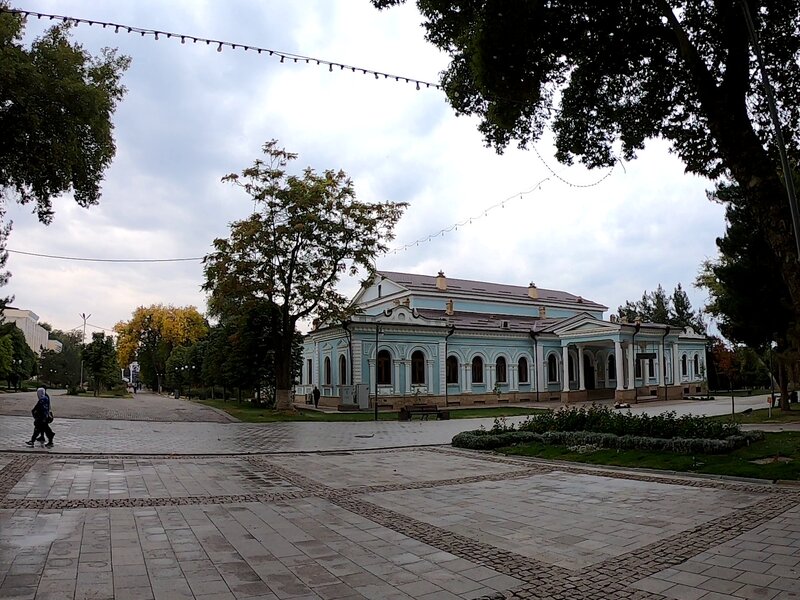
It had rained through the night in Samarkand, and the morning streets were wet and gloomy.
After walking around for a bit, I randomly stepped into a big mausoleum of an ancient military leader. By this point, two things were becoming clear. First, Samarkand was more touristy than the other cities I had visited so far on the trip. The mausoleum was crowded with tourists from all over the world–I could hear English, Mandarin, Russian, French and other foreign languages being spoken everywhere. It was such a contrast from China and Kyrgyzstan where I had just been. Second, the unique Islamic architecture that I admired so much from the pictures, while still interesting, was being repeated everywhere and losing its novelty in my eyes. I was too ignorant of the significance of the places that lay before me. The mausoleum had an imposing facade and impressive interior decorated with gold, but I didn’t even know who was buried there or what they had done. There were many English-speaking guides explaining the history to the groups that passed by, so I was able to eavesdrop and figure out little bits of the history behind the place. But still, the pretty buildings were beginning to lose their appeal.
When I got out of the mausoleum and walked past a sea of shuttle buses chauffeuring tourists around, the rain really started pouring down. I didn’t have an umbrella or a raincoat, so I took refuge in a smaller and less visited building nearby. Only a few curious backpackers walked over to the structure, poked their heads inside, and walked away uninterested. From there, I watched the rain falling on the empty courtyard and on the busy main streets of Samarkand. Eventually, the rain lightened enough that I could walk without getting soaked. I got out of there and decided to check out a place called Registan Square, which was a large public square with some pretty buildings.
There was no shortage of historic buildings with stunning architecture on the way there, though I couldn’t really see what the big deal was. But I came across something more interesting, more personal than all of them combined. What caught my eye was a giant mural on the side of a five-story Soviet-era apartment building. It showed the glory of the traditional lifestyle and the culture of the region. In the mural were some local Uzbek people in their traditional clothing, standing around abundant crops and playing a local musical instrument. Above them, a mythical bird of some sort was soaring high toward the sun.
No one seemed to care about the mural. Why should they? It was some random and insignificant piece of art on a building wall. All around the city there were colorful mausoleums, mosques, and other ancient buildings that were easily many times the size of this humble painting. Still, something about this mural felt more real to me than the other historic places that were deliberately preserved, packaged, and neatly presented to the visitors. The mighty climb of the majestic bird toward the sun looked so out of place under the cloudy and bleak sky that covered Samarkand that day. And instead of locals in traditional clothing playing the local instruments, we had tourist shuttles, ticket offices, and hordes of visitors with insatiable appetites for photographing everything. There was a story in the mural. But sadly we only listen to what screams loudest, and only pay attention to what appears shiniest. So the mural just stood there alone, surrounded by silence, and away from the bustling crowd.
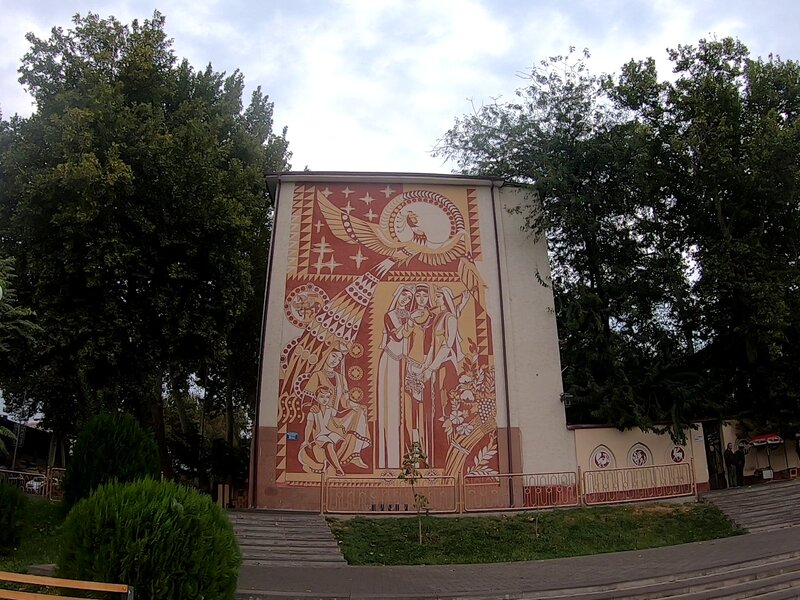
We only listen to what screams the loudest, and pay attention to what appears most shiniest. So no one cared about the mural.
After a quick lunch stop for a bowl of borscht, I arrived at Registan Square. The massive area was surrounded by buildings, each with an entrance more imposing than the last. They were all decorated with ornate mosaics and patterns and had huge blue domes poking into the sky. The entire square was drenched in rain, and my feet got soaked as I walked around. This was the first time that it rained since I started this trip–and it wouldn’t be the last. It was becoming painfully obvious that my worn-out pair of sneakers was going to be a problem in rain. Wet feet couldn’t have been good for my sore throat and runny nose, which were gradually worsening, but there wasn’t much I could do.
Everything was so beautiful and neat, and was presented in a manner that just made perfect sense with an unsettling coherence. Something about all that perfection irritated me. One of those majestic buildings had been built by a legendary astronomer-king, and inside were explanations and life-sized figures recreating scenes where he and other scholars were discussing astronomy. I could see the historical significance of the place and the effort put into preserving it. Yet everything was just a little too perfect. The picturesque buildings, their perfectly restored facades, the immaculate interiors, and the flawlessly curated historical narratives were all too disorienting. I kept going around but couldn’t shake off the feeling of being lost.
Similarly, when I walked over to a nearby mosque that was supposed to be really beautiful and enormous, that was exactly what I saw–a beautiful and enormous building. I wasn’t sure what to take away from it. To my uneducated eyes, the pretty building looked just like the other ones I had seen, only bigger. I looked at the huge crowd that was gathering near the gate to be let inside, and wasn’t sure I wanted to join the same ritual. I passed the building and continued toward the northern part of the city. After half an hour of walking, I stopped at some other mausoleums but didn’t exactly understand what I was meant to see in them, either. They felt just like the other ones I had already seen.
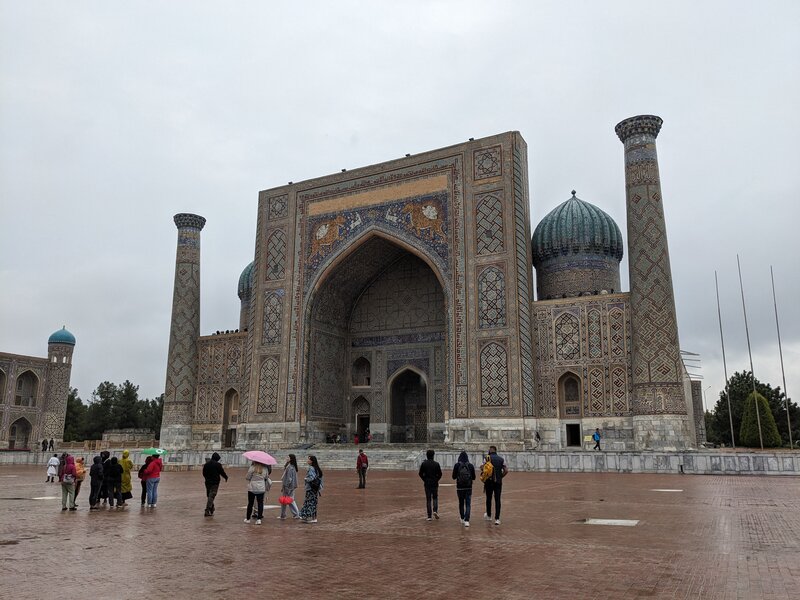
The tall and beautiful buildings were perfectly presented, but I wasn’t sure what to take away from them.
The afternoon slipped away quickly as I roamed around. Dusk began to fall as the daylight gradually faded behind the clouds. But it was a little too early to call it a day. Much as the perfectly presented touristy sites irked me, Samarkand was still beautiful and intriguing in some ways. I walked further to the north to check out this massive excavation site for a medieval settlement. I made my way along an empty road for about twenty minutes. The road was eerily quiet and there was no one else around–it was just me and some random dogs barking in the distance. I think everyone else who was going north was taking a cab on the main streets. Just as I was beginning to think that I was lost, I could see the entrance of a museum and a long road that led to it. The streetlights along the road were flickering helplessly under the falling dusk and the damp air. There were a few buses and small vans in the parking lot, drivers having a few smokes while waiting for the tourists to come back from the museum.
As I was hurrying into the museum to check it out before it closed, somebody loudly addressed me, “Hey!” I was surprised to hear a friendly greeting directed at me. Who could it be? As I turned to face the mysterious acquaintance, I realized that it was none other than Kostya. “Hey,” I gladly returned the greeting, “how are you doing?” We both talked about where we had been that day, and what our plans were for the rest of the day. “I think,” Kostya said, “Samarkand in one day is pretty tight but doable.” I surely hoped so, because I was leaving early the following morning. Kostya and I, it seemed, had been to more or less the same places that day, and only Kostya was just a bit ahead of me because I had been busy in the morning booking the train. We again wished each other luck and parted ways. After that, I walked around the museum and the ruins of an ancient city. I tried to imagine traders and convoys coming all the way here to conduct trade and offer tributes. The excavated wall paintings in the museum showed that it really happened. But it was hard to picture that because the ruin was nothing more than mountains of dirt. The mighty empires had long since crumbled to dust, along with the memory of the Silk Road.
After the settlement site, I continued on that empty road toward the northern part of the city to go to an observatory. I wasn’t entirely sure about going there at first, but it was still a bit early to go back to the hostel, and the story of the astronomer-king who built the place was pretty cool. He was apparently a ruler of a medieval empire who was well-versed in science and astronomy and built all these observatories and schools. I figured I’d check out one more nice-looking building in Samarkand. What was one more pretty building anyway, since I was leaving tomorrow? After the observatory, I would have seen most of what Samarkand’s old city had to offer, the neatly organized and presented version of it anyway. As Kostya said, Samarkand in one day was doable in that sense. It was bizarre to be walking that wet and empty road alone in the dusk, so I kept walking diligently, hoping to join the main road where there was at least some traffic.
Suddenly, I recognized something on the side of that lifeless and desolate road. And it was so full of meaning and life that it once again pumped excitement into my heart that had become jaded from the perfection that surrounded me. It was a set of statues showing a small caravan of three men moving forward with their camels. One step at a time, silently facing the obstacles headlong, they were just moving without complaint. The guy in the front, in particular, had this facial expression of someone who was bearing the full weight of uncertainty that lay ahead and was totally okay with that. He simply crossed his hands behind his back, and was putting one foot in front of the other, leading the weary caravan forward.
In those lifeless statues, I saw a glimpse of life because their struggle resembled my trip to Dublin. Already 6,300km (4,000mi) in but still around 9,000km (5,600mi) more to go, with less than thirteen days remaining, I had been secretly doubting whether I could make it. Yet the quiet march of the caravan instilled in me a simple but powerful realization: a lack of certainty was no reason for doubt or despair. It was how I approached the uncertainty that mattered. I could either keep doubting or choose to take a small step into the unknown. Every step had a chance of being a wrong one. But as I saw in those distant flickering night lights in the Irkeshtam Pass, some things are only worthwhile because of their chance of spectacular failure. Maybe things weren’t so different for the caravans that traveled the Silk Road before my time. They would have seen their own glimmering lights in the distance and chosen to go forward, knowing all too well that their steps could lead to failure.
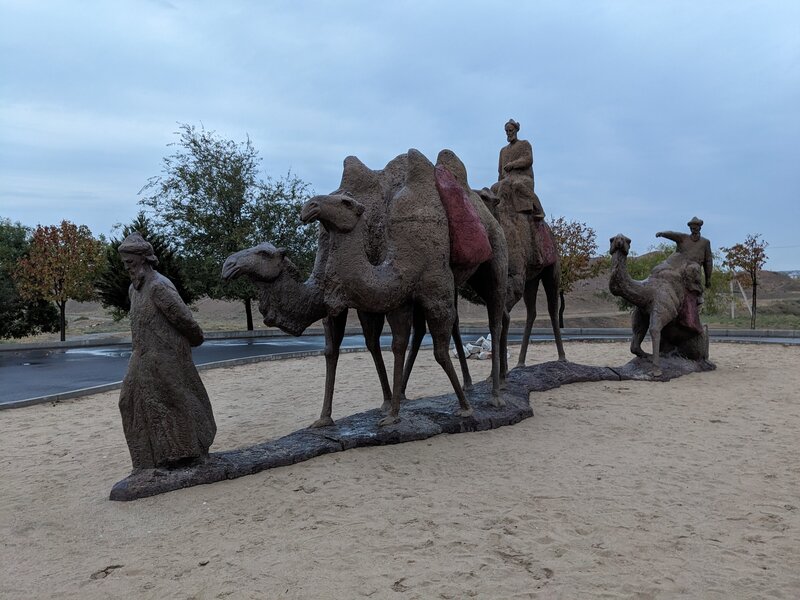
The lifeless caravan told me that a lack of certainty was no reason for doubt, and that what mattered was taking the next step at the risk of a spectacular failure.
Soon the empty road ended and I joined the bustling main streets with puddles of rainwater reflecting the colorful headlights of the cars and the street lamps. The sun had already set long ago and the sky was dark. It started drizzling all of a sudden, and along with the rain came the cold. And I remembered that I was actually feeling unwell. It could have been bad if I continued to walk around in the rain, dressed as I was in a cheap, worn-out jacket. If I was going to catch that 5:20AM train out of Samarkand, I needed to recover by getting some rest and keeping warm. Having walked all the way here, there was no turning back–I reluctantly climbed the hill toward the observatory, unsure about my choices. But when I caught a glimpse of the observatory on top of the hill, I was glad to be there. Soaked in the rain and the red and blue lights, the building had an air of magical charm. Maybe I was too quick to judge the neatly presented buildings in the city. I had discounted them as too perfect and artificial and lamented that people didn’t pay attention to what I thought was more “real.” But maybe I too was guilty of the oversight of ignoring what wasn’t readily seen. I stood there for a while, admiring the magical appearance of the observatory under the night rain.
I walked all the way back to the main part of the old city from the observatory because the bus wasn’t running. Walking for an hour in the cold night rain wasn’t a good idea, but I didn’t want to take a cab. On the way back, I could feel that my sore throat wasn’t getting better. I figured I’d try some remedy by gargling with salt water, something I used to do when I felt unwell back home. Of course, the supermarkets didn’t just sell a bottle of salt water. I had to buy a large bag of salt, pour some of the salt into a water bottle, and shake it. I must have looked shady doing all that on a roadside at night. I silently walked back to the Registan Square while trying the remedy. All the mosques, mausoleums, and madrasas were now drenched in the rain and illuminated by carefully placed artificial lights.
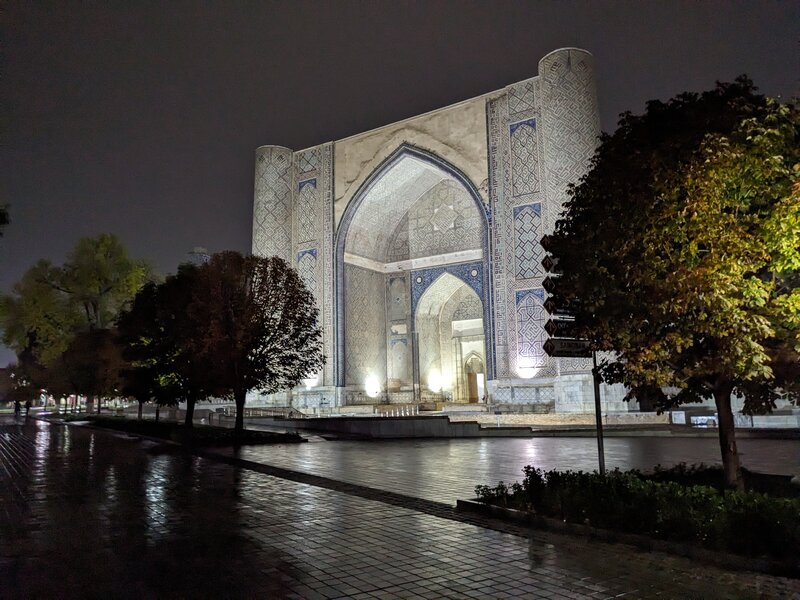
All the pretty buildings were drenched in rain and carefully illuminated by artificial lights.
It was past nine o’clock when I arrived at the hostel, drenched in rain and absolutely exhausted. Some people were chilling in the room, staring at their phones. While unpacking my stuff, I greeted one of them, “Zdravstvuyte, otkuda vi?” (“Hello, where are you from?”) Before the guy could answer, another person behind me said with curiosity, “Govorish’ po-russki?” (“Speak Russian?”) His name was Aleksi, and he continued, “On iz Samarkanda, i ya iz Moskvy. Otkuda, drug?” (“He’s from Samarkand and I am from Moscow. What about you, friend?”). Everyone introduced themselves and started talking about where we had been and where we were going next. Aleksi had been taking it easy in Samarkand for a couple of days after having traveled in the western part of Uzbekistan. He showed me all the pictures he took from places like Khiva and Nukus and told me that I must go there. The cities looked super interesting. But having already bought all the tickets to Baku, I learned to accept the fact that I just didn’t have time to visit everywhere.
“Pochemu sol?” (“What’s with the salt?”) the guy from Samarkand asked, pointing at my giant bag of salt as I was unpacking. I wasn’t sure how to explain it, so I just said, “Dlya zdorov’ya” (“For health”) but I think everyone misunderstood that I was drinking the salt water for hydration or something. The answer to the question “What’s with the salt?” would have been complicated. The question pointed at why I was pushing myself to cover so much distance in so little time. The truth is that I didn’t know why I was on the road and why the trip mattered. So it was no surprise that “Dlya zdorov’ya” was all I could muster.
After making some friends and staying dry for a while, I felt much better. I headed downstairs to the common area with a laptop to plan what I was going to do once I got to Baku in the next few days. There, a group of six or seven Chinese travelers were chilling and playing a game of Uno. As I walked into the area, they looked at me curiously and I at them. They asked, “Nihao, shi zhongguoren ma?” (“Hey, are you Chinese?”) “Bu shi,” I replied, “wo shi hanguo chushengde” (“No, I’m Korean-born”). The table lit up with excitement at my attempt to speak Mandarin. We exchanged some pleasantries and talked about our trips in a weird mixture of Mandarin and English, and quickly became friends. They pulled a chair and invited me to join their game of Uno. Having already reverse-engineered the rules of the game and the Chinese phrases in Kashgar, I already knew what to say and do. The table heated up as I said the correct Mandarin phrases along with the cards I played. To spice things up, we decided to make the winner draw silly things on the losers’ faces using a make-up pen. I ended up with whiskers and what looked like a black eye.
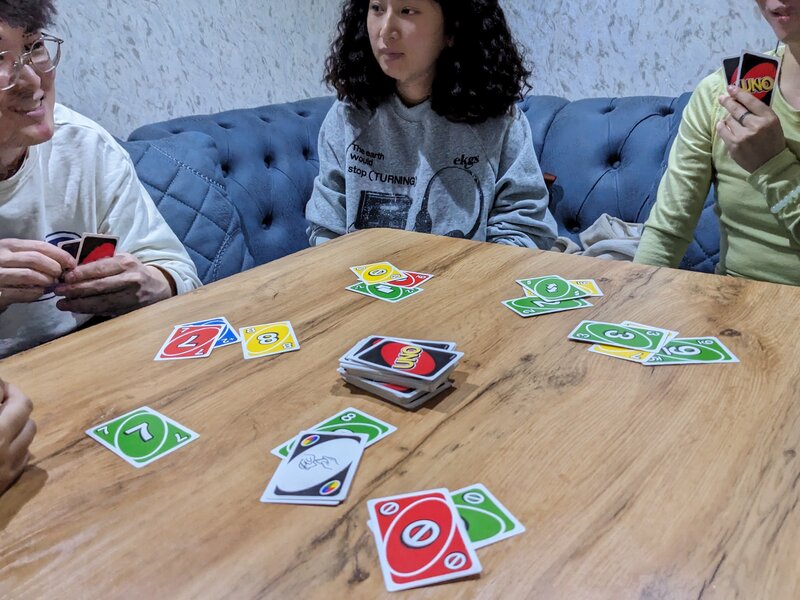
I ended up with whiskers and a black eye at an Uno game with Chinese friends.
The new friends asked me where I had been before coming to Samarkand. When I told them that I crossed into Central Asia from Xinjiang, one guy was surprised and asked the table whether “waiguoren” (“foreigner”) was allowed to go to Xinjiang. And people at the table kind of said something along the lines of “Sure, why not?” It seemed like the question somehow made him lose face, and everyone brushed it off with laughter. “Ni yao qu nali?” (“Where are you going next?”) the friends asked. I told them that I was headed to Baku in a few days. It turned out that some of the people in the group were also going to Azerbaijan in a few days. One of the girls, who said I could call her by her nickname “Sakoto,” told me that three of them were headed back to Tashkent soon to catch a flight to Baku. I told them that I was doing exactly the same thing, but unfortunately we were going on a different day. Everyone decided to keep in touch in case our paths crossed in Baku or beyond. It was getting pretty late but it was clear that no one was going to sleep any time soon. I wanted to indulge in the conversation further but was feeling the squeeze of having to plan my next moves from Baku.
I retired from the game and started researching how I would reach Europe from Baku. But I didn’t make any progress on my search as I was pretty tired and the game of Uno was still actively going on next to me. I said goodbye to my new friends and went upstairs to get some sleep. My train was at 5:20AM the next morning and it was already getting close to midnight. I set my alarm for 3:40AM and crawled into my bed, hoping to catch at least a few hours of sleep. Aleksi, upon learning that I was leaving the next morning, told me to drop him a line if I ever visited Moscow. I fell asleep, crossing my fingers that I wouldn’t sleep through the alarms and that my sore throat wouldn’t feel worse the next day. The taste of salt water was still fresh in my mouth.